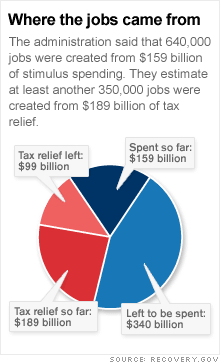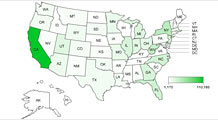Stimulus creates 640,000 jobs
White House releases first broad look at stimulus-funded employment, focusing on $150 billion in spending. But skeptics question the number and quality of the jobs.

WASHINGTON (CNNMoney.com) -- The largest stimulus program in the nation's history has created or saved just over 640,000 jobs, the Obama administration said Friday.
Based on $159 billion in spending from the $787 billion recovery package, the tally is the first broad, concrete look at the stimulus program's impact on the economy. The numbers are drawn from 57,000 reports from state and local recipients and include as many as 30,000 jobs from private companies.
The White House posted Friday afternoon complete reports on its stimulus data tracker Recovery.gov. The site allows visitors to check what jobs were created and where, down to the zip code level.
But the number of stimulus-created jobs is also a very controversial and elusive figure. Republicans quickly questioned the validity of the White House report, saying it exaggerates the recovery act's effectiveness.
The Obama administration continued to maintain that the actual number of jobs created so far is closer to 1 million. The reports did not reflect measures such as tax cuts, boosted unemployment benefits or jobs created indirectly by stimulus spending. A total of $340 billion has been drawn down so far under the American Recovery and Reinvestment Act.
"Every dollar being spent from Recovery Act is helping put someone back to work," said Vice President Joe Biden, citing 80,000 construction jobs and 325,000 education positions created or saved by stimulus funds. "My message today is that we're on track."
Friday's numbers were quickly used by both Democrats and Republicans to further their arguments about the value of stimulus. Each job cost $248,000 to create.
The White House maintains that the funding saved the country from slipping into a depression and fueled the 3.5% growth in the economy in the third quarter. The Recovery Act, which is expected to save or create 3.5 million jobs by the end of next year, will continue boosting the economy since more than half has yet to be spent.
"There is a lot more ammunition left in the stimulus package," said Jared Bernstein, Biden's chief economist.
Republicans point to the rising unemployment rate, now at a 26-year high of 9.8%, as a sign that the recovery act is a failure. Other critics say that the administration's 1 million jobs figure is based on math calculations that are impossible to verify.
"The trillion dollar 'stimulus' isn't working, and no amount of phony statistics can change that," said House Republican Leader John Boehner, R-Ohio. "The president and his economic team promised the 'stimulus' would create jobs 'immediately' and unemployment would stay below 8%. But America has lost more than three million jobs since then, and the unemployment rate is nearing double digits."
Boehner also pointed to a memo from Carnegie Mellon professor Allan Meltzer, who said that the White House is misleading the nation by saying the Recovery Act has saved jobs.
"One can search economic textbooks forever without finding a concept called 'jobs saved,' " wrote Meltzer, who served as an economic adviser under President Ronald Reagan. "It doesn't exist for good reason: how can anyone know that his or her job has been saved?"
The administration's announcement also underscores how difficult it is to reliably size up the effectiveness of the massive stimulus program.
Recipients were tasked with calculating the number of full-time positions directly created or saved with stimulus funds as of Sept. 30. This is far from a simple, straightforward process. The instruction booklet alone was 60 pages long and the form had 99 data fields to complete, said Tim Dowd, chief executive of Input, a research company that follows government spending for contractors.
Two weeks ago, the government provided an early glimpse of the challenges of transparency when it reported that 30,383 jobs had created by stimulus-funded federal contracts given directly to companies. Within hours, errors emerged, including an initial report that a French vaccine maker received the largest stimulus contract, $1.4 billion. In fact it received an award one-100th the size.
Compiling state and local recipients' data is an even tougher lift. Though federal officials have been fact-checking the reports for the past three weeks, there are likely to be many mistakes. Biden acknowledged as much in a press conference.
"There will be a lot of discrepancies in the data," said Dowd. "Those discrepancies will grow significantly, not because of malicious intent but because of the complexity."
Among recipients' biggest hurdles are accounting for part-time or short-term jobs created, for people working on multiple stimulus projects and for positions saved recovery act funding.
Also, the job numbers do not include indirect positions, such as the deli worker who delivers lunch to the stimulus-funded construction sites or the concrete company that has to ramp up production to handle an increased number of contracts.
"The job numbers are at best going to be a rough outline of how the recovery act is impacting the economy," said Craig Jennings' senior policy analyst at OMB Watch, a government watchdog group.
The number of stimulus-fueled jobs created or saved vary widely among the states.
California led the pack with more than 110,000 jobs from $18.5 billion in recovery act money. Wyoming came in last with 860 jobs created or saved from $472 million in stimulus funds.
Appearing with Biden Friday, California Gov. Arnold Schwarzenegger said stimulus funds were responsible for saving or creating 62,000 education positions. "Those teachers would have been gone," he said.
Other states released data this week that shows the complexity of the reporting.
Maryland announced Thursday that recovery funds fueled 4,464 direct positions. Officials also estimate that 1,451 indirect jobs were created or saved, while another 8,167 jobs were created or saved because of increased stimulus-related consumer spending. The state received awards of over $2 billion but spent only 11% of these funds, or $229 million.
"There are more than 14,000 Marylanders working today that otherwise would be facing unemployment," said Gov. Martin O'Malley.
In Massachusetts, a total of 23,500 residents were working because of the recovery act, said Gov. Deval Patrick on Wednesday. The state reported to the federal government that stimulus accounted for 8,800 full-time direct jobs. The state received about $4 billion in recovery funds.
"This report shows that our work is paying off," said Patrick. "Real jobs are being created or saved, real projects are underway and we're making real investment in our long-term economy."
--CNNMoney staff writer David Goldman contributed to this report.
Do you have a job because of the $787 billion stimulus package? We want to hear from people whose jobs have been created or saved by the American Recovery and Reinvestment Act. Please e-mail your stories to CNNMoney.com and you could be part of an upcoming article. For the CNNMoney.com Comment Policy, click here. ![]()



